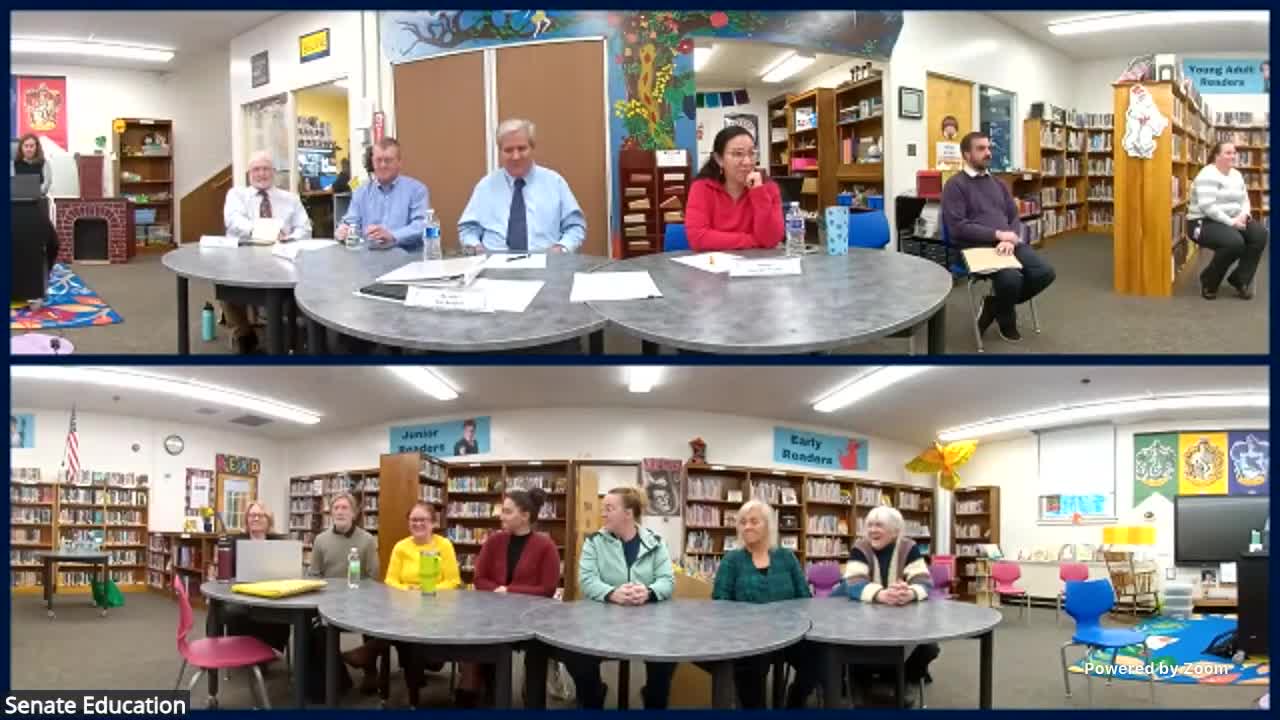Senate education committee hears Canaan leaders warn funding rules and rising costs threaten rural schools
Get AI-powered insights, summaries, and transcripts
Subscribe
Summary
Senate Education Committee Chair Seth Bongart and members met with Canaan-area school board members and educators to hear how rural student choice, enrollment patterns and state funding rules affect local programs and budgets. Local leaders urged the committee to preserve small schools and expand shared services rather than pursue consolidations that would increase student travel and erode community ties.
Senate Education Committee Chair Seth Bongart and members met with Canaan-area school board members and educators to hear how rural student choice, enrollment patterns and state funding rules affect local programs and budgets. Local leaders urged the committee to preserve small schools and expand shared services rather than pursue consolidations that would increase student travel and erode community ties.
At the start of the visit, Kyle Decker, chair of the DMSU and Northeast Kingdom (NEK) Choice, said "Choice was formed when Act 46 occurred, and we combined with Canaan" to give very small towns a shared administrative structure and a stronger voice. Decker said the Choice partnership represents just under 300 students (not including Canaan) and has allowed small towns to pool resources; he added that keeping the option for towns close to the Connecticut River to send students across the river to nearby New Hampshire schools is vital to avoid long commutes and loss of local participation.
Renee Marsheson, chair of the Canaan School Board, and other local board members described a prior interstate cooperative (the Connecticut River Collaborative) that allowed student swaps and shared classes; that arrangement ended, they said, and some residents were upset when the formal swap mechanism folded. A board member stated that they had been "told" that "funding cannot cross the river if you have an operating [district]," though no statute citation was provided during the meeting. Committee members and local officials discussed that SAU 7 (New Hampshire) was not currently pursuing an interstate district but that sharing arrangements could still be explored if statutory barriers were clarified.
Board members discussed enrollment and tuition. Local speakers estimated NEK Choice enrollment at about 300 students (excluding Canaan) and said roughly 22 students come from nearby New Hampshire towns (Norton, Lunenburg, Bloomfield and occasionally Brunswick); they also estimated another 8–10 New Hampshire tuition students attend Canaan at times. Speakers framed these counts as approximate rather than exact figures.
Several presenters emphasized that Canaan's school serves as more than an academic institution. "In rural areas, the schools aren't just a school. It's the heart of the community," said Raelene, a local board member, describing the school's role in community service, after-school activities and local identity. Board members warned that consolidation or long daily bus rides would reduce after-school participation, curtail CTE and extracurricular opportunities, and undermine towns' ability to retain families and businesses.
Multiple speakers described recent budgetary pressures and program cuts. Krista Degan, a first‑year school board member, said after-school and CTE programs have been successful but that recent funding reductions and state guidelines forced cuts; those reductions, speakers said, have left the district with fewer vocational offerings. Local officials reported that last year's budget situation left the district roughly $200,000 over the state's excess spending threshold after cuts, prompting additional fiscal strain and questions about what must be cut in future budgets to avoid penalties.
Martha Vanderwolk (Canaan and ENSU board member) urged the committee to implement shared services recommended by a prior task force and said the district has been hurt by a tax structure that yields a high assessed value per pupil despite low individual property sale values. Vanderwolk criticized large health‑insurance premium increases and suggested the state consider self‑insurance across public employees to reduce costs; she added that federal funding uncertainty complicates local planning.
Speakers repeatedly called for more flexible statutory tools and for state support that recognizes the distinct realities of remote small towns: maintaining local schools, enabling cross-border sharing where feasible, and stabilizing funding for CTE and after‑school programs. Committee members listened and asked clarifying questions but no formal motion or vote took place during the visit.
The committee proceeded to the next site visit after concluding the conversation with Canaan board members; participants said they appreciated the opportunity to share local experience and urged follow-up on statutory barriers and shared-service options.
